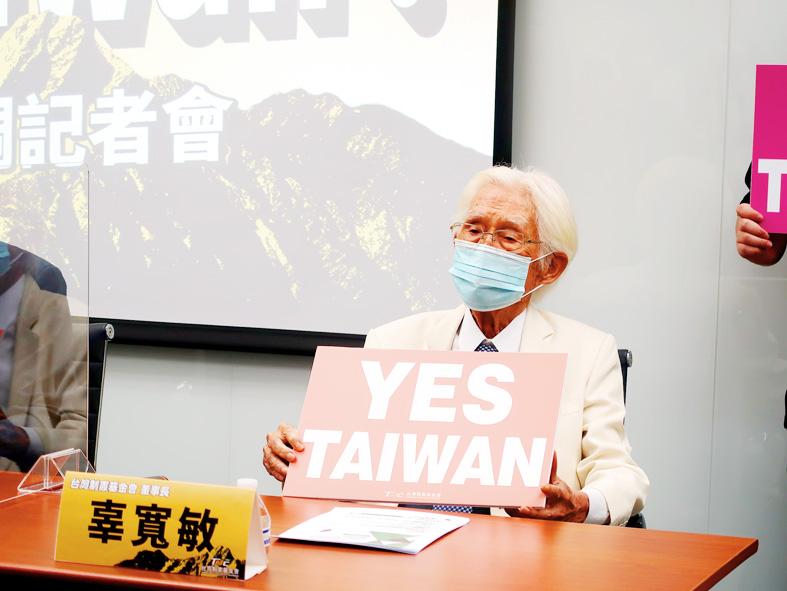Nearly 90 percent of the public identify themselves as Taiwanese and about two-thirds said they are willing to fight for the country in case of war, a survey released yesterday by the Taiwan New Constitution Foundation showed.
The question about national identity showed that 89.9 percent identify themselves as Taiwanese and 4.6 percent as Chinese, while 1 percent consider themselves to be both, the poll showed.
Given more than one choice, 67.9 percent of respondents said they are Taiwanese, 1.8 percent said they are Chinese and 27.9 percent said they are both, the survey showed.

Photo: Chen Yu-fu, Taipei Times
The survey also showed that 36 percent of respondents said they would absolutely go to war to defend Taiwan, while 28.3 percent said they probably would, 12.7 percent said they would not and 7.4 percent had no opinion.
Asked about Taiwan’s future, 50.1 percent of the public support maintaining the “status quo,” 38.9 percent back independence and 4.7 percent favor joining China.
Asked about their perceptions about other countries, Japan received the most positive view with 83.9 percent, followed by the US with 75.6 percent.
In contrast, the majority, or 70.3 percent, have a negative view of China, while only 16.4 percent have a positive view of Taiwan’s neighbor across the Strait.
Asked about the recently concluded Tokyo Olympics, 65.1 percent of respondents said they referred to the country’s Olympic delegation as “Taiwan” in conversation, while 27.6 percent said they called it “Chinese Taipei” or “Zhonghua” (中華), the poll showed.
More than 82 percent said they regretted that the country took part in the Tokyo Olympics under the name “Chinese Taipei,” and that the national flag and anthem could not be displayed during the Games, it said.
Foundation chairman and founder Koo Kwang-ming (辜寬敏), 94, said he has supported Taiwan’s normalization as a country for five decades and hoped to achieve that goal in his remaining years.
Taiwan can only transition to a normal country by becoming the “Republic of Taiwan” — not by keeping the name Republic of China (ROC), he said, adding that the poll proves that normalization is the public’s common aspiration.
President Tsai Ing-wen (蔡英文) must decide if she agrees with their view that her administration exists under the ROC’s Constitutional framework and the Constitution must therefore be changed, he said.
Asked about party affiliation, 31.1 percent of respondents support the Democratic Progressive Party, 12.4 percent back the Chinese Nationalist Party (KMT) and 11.4 percent favor the Taiwan People’s Party, foundation deputy director Lin Yi-cheng (林宜正) said, adding that the New Power Party and Taiwan Statebuilding Party each had 3.8 percent.
The future for defining Taiwan’s status in the world and the rectification of its name rest on developing the Taiwanese national identity, he said.
Foundation deputy director Sung Cheng-en (宋承恩) said the percentage of people who identified as Taiwanese in the survey marked a substantial increase from 83 percent last year.
The poll, conducted from Tuesday to Friday last week, collected 1,071 valid samples and had a margin of error of 3 percentage points.

A magnitude 5.6 earthquake struck off the coast of Yilan County at 12:37pm today, with clear shaking felt across much of northern Taiwan. There were no immediate reports of damage. The epicenter of the quake was 16.9km east-southeast of Yilan County Hall offshore at a depth of 66.8km, Central Weather Administration (CWA) data showed. The maximum intensity registered at a 4 in Yilan County’s Nanao Township (南澳) on Taiwan’s seven-tier scale. Other parts of Yilan, as well as certain areas of Hualien County, Taipei, New Taipei City, Taoyuan, Hsinchu County, Taichung and Miaoli County, recorded intensities of 3. Residents of Yilan County and Taipei received

Taiwan has secured another breakthrough in fruit exports, with jujubes, dragon fruit and lychees approved for shipment to the EU, the Ministry of Agriculture said yesterday. The Animal and Plant Health Inspection Agency on Thursday received formal notification of the approval from the EU, the ministry said, adding that the decision was expected to expand Taiwanese fruit producers’ access to high-end European markets. Taiwan exported 126 tonnes of lychees last year, valued at US$1.48 million, with Japan accounting for 102 tonnes. Other export destinations included New Zealand, Hong Kong, the US and Australia, ministry data showed. Jujube exports totaled 103 tonnes, valued at

BIG SPENDERS: Foreign investors bought the most Taiwan equities since 2005, signaling confidence that an AI boom would continue to benefit chipmakers Taiwan Semiconductor Manufacturing Co’s (TSMC, 台積電) market capitalization swelled to US$2 trillion for the first time following a 4.25 percent rally in its American depositary receipts (ADR) overnight, putting the world’s biggest contract chipmaker sixth on the list of the world’s biggest companies by market capitalization, just behind Amazon.com Inc. The site CompaniesMarketcap.com ranked TSMC ahead of Saudi Aramco and Meta Platforms Inc. The Taiwanese company’s ADRs on Tuesday surged to US$385.75 on the New York Stock Exchange, as strong demand for artificial intelligence (AI) applications led to chip supply constraints and boost revenue growth to record-breaking levels. Each TSMC ADR represents

Pro-democracy media tycoon Jimmy Lai’s (黎智英) fraud conviction and prison sentence were yesterday overturned by a Hong Kong court, in a surprise legal decision that comes soon after Lai was jailed for 20 years on a separate national security charge. Judges Jeremy Poon (潘兆初), Anthea Pang (彭寶琴) and Derek Pang (彭偉昌) said in the judgement that they allowed the appeal from Lai, and another defendant in the case, to proceed, as a lower court judge had “erred.” “The Court of Appeal gave them leave to appeal against their conviction, allowed their appeals, quashed the convictions and set aside the sentences,” the judges